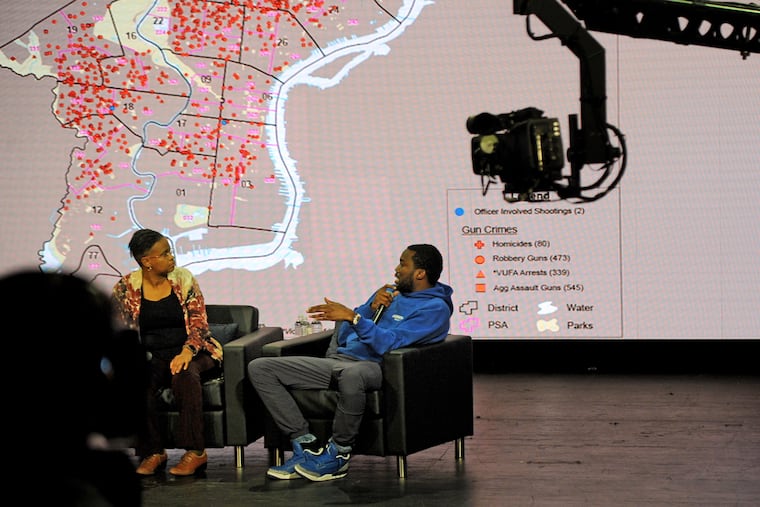Malcolm Jenkins’ police commissioner forum helped envision future of Philly policing | Opinion
A forum of local activists, community leaders, and celebrities with Philly roots looked ahead last week to the future of policing in Philadelphia.

On Oct. 28, Malcolm Jenkins lent his celebrity to an incredibly important topic: What qualities Philly’s next police commissioner should have. Jenkins hosted a Players Coalition public forum at the Community College of Philadelphia to discuss next steps, since former Commissioner Richard Ross resigned in August and a national search to identify a new commissioner is now underway. The forum performed a necessary public service: centering perspectives from oppressed individuals. Participants offered uncompensated emotional and mental labor. They took part even though they have already depleted their stamina by surviving in a system overwhelmed with racism, classism, and other arms of oppression.
The forum included local activists, community leaders, and another celebrity: Meek Mill. All involved discussed the challenges facing the Philadelphia Police Department in deeply personal ways. Their demands were appropriately accompanied by feelings of exasperation, confusion, exhaustion, and pain. But they ultimately highlighted ways for the police department to move forward.
From their responses, here are some key goals and qualities that residents hope to see in the next police commissioner:
1. Confront trauma: Participants mentioned the fear many people, especially black people, have during police car stops. This seemed to be a call for the next commissioner to engage in a process of understanding and acknowledging current trauma and past harms in order to foster reconciliation with the communities that experience this fear.
2. Balance harm reduction with criminalization: Some speakers suggested that whole communities do not trust the police and believe that police action is designed to destabilize communities. This seemed to be a call for the next commissioner to consider the effects of policies that aim to prevent criminalized activities, but may, in fact, do more to harm marginalized people.
3. Dedication to oversight: Many residents mentioned “accountability,” indicating their belief that police cannot be relied upon to investigate themselves. One panelist referenced their concern that outside entities such as the Plain View Project, not the department, identified problematic trends like the bigotry displayed in officers’ Facebook posts. This is a request that the next commissioner bolster internal, and embrace external, oversight. Most notably, the community is asking for a commissioner who would eliminate contact between residents and officers guilty of misconduct.
4. Allegiance to antiracist policies: On several occasions, speakers framed the police as inherently racist. Their expectation seemed to be that the next commissioner not only accepts that racism is a problem in the city, but also offer tangible solutions.
5. Challenge PPD culture: City residents highlighted problematic aspects of PPD culture, including sexism and the code of silence that stops officers from reporting one another. This was a call for the next commissioner to transform that culture.
6. Assess officer behavior: A resident challenged the PPD hiring preference for former military personnel and suggested that some of these officers are overly aggressive — acting as occupiers and not guardians. This is a request for the next commissioner to confront officer aggression.
7. Equitable police discretion: Participants discussed the power of police discretion to drastically alter a person’s life. In the school to prison pipeline, a decision to involve police in alleged student discipline can be catastrophic for youth. Police involvement can result in financial strain, loss of freedom, and long periods of control for both youth and adults with the brunt of thoughtless police decision-making being disproportionately felt by black people and black communities. The community would like for the next commissioner to commit to holistic discretionary practices that take into account these disparities.
Everyone recognized that the police are but an entry point to a criminal justice system that is historically racist and unjust. This system goes beyond policing and includes courts, jails/prisons, probation/parole, and the school system. The next commissioner cannot change all these elements. However, they will need to be aware of their role in the system and residents are asking for them to be an ally in their quest for equity.
The next commissioner will need to listen intently to the needs of the residents and ensure that their officers are prepared to respond in the most harm-reducing methods available. Philadelphia residents most affected by PPD decisions have told us what they need in the next commissioner. Are we listening?
Hans Menos is the executive director of the Philadelphia Police Advisory Commission, where Anjelica Hendricks and Janine Zajac are policy analysts.